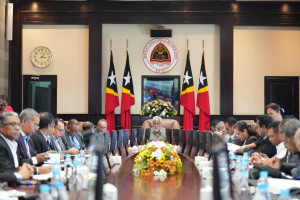Government approves special scholarship scheme for the justice sector

At its meeting on March 27th 2024, the Council of Ministers approved the draft Decree-Law on the special scholarship scheme for the justice sector, presented by Prime Minister Kay Rala Xanana Gusmão.
The scholarships are intended to fund higher education programmes to obtain bachelor's, master's and doctoral degrees in civil legal sciences, training in forensic medicine, professional training courses, specialised training for trainees at the Centre for Legal and Judicial Training, and professional internships for the exercise of a profession.
The programme will be financed by the Human Capital Development Fund and managed by the Justice Sector Reform Working Group under the direction of the Prime Minister.
The scholarship programme aims to motivate secondary school students to learn, improve their learning capacity, and broaden the horizons of its beneficiaries. It also ensures mastery of official languages in the justice sector, fills the shortage of qualified human resources in the justice sector, and raises the qualification levels of justice sector professionals.
Citizens who fulfil all of the following requirements may apply for scholarships under this diploma: they must be Timorese, be aged 17 or over and under 40, and be proficient in Portuguese and English. In addition to these requirements, candidates must also fulfil one of the following, depending on the case: have an excellent academic record while attending secondary school sufficient for admission to the degree to which they are applying; are attending degrees in legal sciences in foreign higher education; have a degree in legal sciences and have been admitted for a master's degree, professional training or professional internship in foreign higher education institutions; have a master's degree in legal sciences and have been accepted for a doctorate in foreign higher education institutions; or have a degree in medicine, for applications to obtain the speciality of forensic medicine.










































